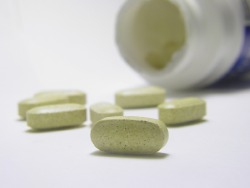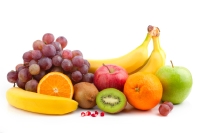
Vitamins are substances that come from the products we eat. Each vitamin plays an important role in our health; it is believed that humans need at least thirteen vitamins to be healthy. However, depending on age and health some vitamins are not as necessary as others.
Some of the most important vitamins needed by the body are:
- Vitamin A: This vitamin is needed for growth, sight and healthy skin and hair.
- Vitamin B: The Vitamin B family is made up of a number of other B vitamins such as Vitamin B1, B2 B6, and B12. Vitamin B as a group is needed for the proper functioning of our nervous system, helps in promoting healthy skin and provides relief from stress. Each B vitamin has a special role to play in keeping us healthy.
- Vitamin C: This vitamin is ascorbic acid. It can strengthen the immune system which helps in the prevention of colds. It also helps us absorb iron and calcium.
- Vitamin D: Referred to as the sunshine vitamin because we get much of our daily requirement from sunshine (you still need to use sun protection in the sun to protect against skin cancer). It also helps in cell growth.
- Vitamin K:The proper functioning of our kidneys is dependent on this vitamin.
The best food sources of vitamins
The vitamins we need come not only from the food we eat, but also from supplements. Taking supplements is a good way to ensure that we are getting our daily requirement of each vitamin.
The only way to be sure that you get the vitamins needed to maintain good health is by eating a mix of all food groups. Using the newly revised food pyramid we should be able to get most, if not all of our vitamins daily.
The following is a list of vitamins and the foods in which they occur naturally:

- Vitamin A: colourful fruits and vegetables such as carrots, in meat; liver, beef and chicken, and also in milk
- Vitamin B: whole grains, orange juice, baked potatoes, dairy products, beef and bananas.
- Vitamin C: citrus products such as oranges and lemon, as well as mangoes, kale and green pepper.
- Vitamin D: fish and fish oils are good sources: cod-liver oil, sardines, tuna, mackerel and of course, sunlight
- Vitamin K: green leafy vegetables such as cabbage, Brussels sprouts, as well as liver
Because the body cannot produce the vitamins it needs, we can never be really sure that we are getting all that we need from our food. It is for this reason that supplements are sometimes necessary to ensure that we are consuming all the necessary vitamins for optimal health.
Caution when cooking foods, you may lose some of the vitamin content
The most important thing is to eat from the five major food groups. However, preparation of the food will also impact on how much vitamins you will get from each. Some vitamins are lost in cooking, while others are water soluble and will dissolve in water. The water used in cooking water soluble vitamins should be consumed if possible.
Despite all the benefits to be derived from taking our vitamins (regardless of whether it is from our food or supplements) we can also become ill from having too much of any one vitamin. For instance, too much Vitamin B1 (thiamine) can lead to wheezing, skin rashes and even swelling of the face.



Be the first to comment